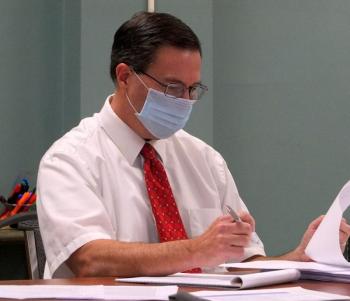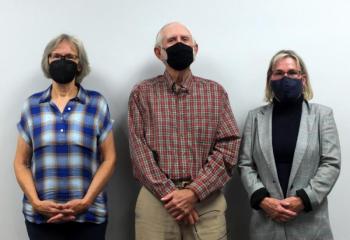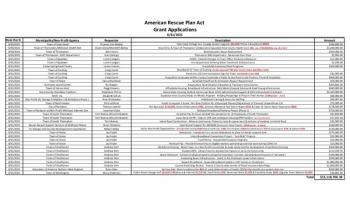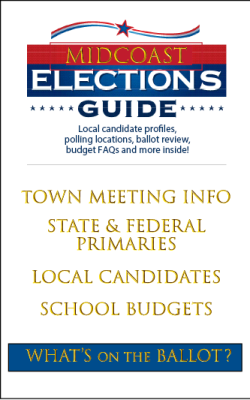ROCKLAND – Knox County Commissioners agreed Sept. 14 at a regularly scheduled meeting that the number of applications for the county’s $7.7 million share of the American Rescue Plan Act federal funding were so many, and amounted to so much, that they will engage a consultant to sort through them all.
The Commissioners met, as usual, in chambers at the Knox County Courthouse. The agenda was lengthy, and the meeting continued for more than three hours. The discussion over the ARPA money had been highly anticipated by area municipalities and nonprofits, which are hoping to get a piece of the pie.
Counties across the country received $65.1 billion overall with payments based on the county’s share of the U.S. population.
According to Andrew Hart, Knox County administrator, the county has received but half of $3.85 million of the overall monies with the second half due in May of 2022.
“As far as municipalities and nonprofits go, we had received about 35 requests that total a little over $13 million,” said Hart. “The [county] department requests, which is ever-changing, is up to around $4 million with a couple of things we are still trying to get pricing on, so we are up in the neighborhood of $17-18 million.”
He continued: “Right now, I have a stack of paperwork this high sitting in Wendy’s office that I haven’t even attempted to look at it with all the other things we have going on other than putting this list together. The commissioners need to decide what the next steps will be that we need to maneuver through.”
Wendy Galvin is the Knox Count Administrative Assistant.
Hart said the commissioners will need to decide what departmental requests meet the criteria first in terms of what is eligible and what isn’t and that will allow them to deal with municipal and nonprofit requests.
“The bottom line is we have more requests than we have money,” said Hart. “There will be some who are told your project is not eligible or we don’t have enough money.”
Hart said that with all the business before the county, the administrator’s office felt the need for help with sifting through the requests.
“I reached out to Waldo County,” said Hart. “They used a law firm out of Bangor. I reached out to Lincoln County and they’re using their planning department to do a lot of the work, though they might be using someone else. We’re reaching out to see who might be available, but we certainly want the right individual.”
Hart said it made sense to start with departmental requests first.
“We legitimately have some expenditures we need to do and are qualified,” he said. “It will ultimately save the county money and the municipalities money because we had budgeted that.”
Commissioner Sharyn Pohlman clarified that the eligibility of a request is based on the Interim Final Rule issued by the United States Treasury. The rule reads in part as follows.
Section 602 and section 603 contain the same eligible uses; the primary difference between the two sections is that section 602 establishes a fund for States, territories, and Tribal governments and section 603 establishes a fund for metropolitan cities, non-entitlement units of local government, and counties. Sections 602(c)(1) and 603(c)(1) provide that funds may be used: a) To respond to the public health emergency or its negative economic impacts, including assistance to households, small businesses, and nonprofits, or aid to impacted industries such as tourism, travel, and hospitality; b) To respond to workers performing essential work during the COVID-19 public health emergency by providing premium pay to eligible workers; c) For the provision of government services to the extent of the reduction in revenue due to the COVID–19 public health emergency relative to revenues collected in the most recent full fiscal year prior to the emergency; and d) To make necessary investments in water, sewer, or broadband infrastructure.
“After the Interim Criteria, what is the need and how urgent is it,” asked Pohlman. “A lot of the requests there are overlapping requests, so are there collaborative opportunities to pull together what several towns are asking for. And moving forward from there putting some eyes on it that are more knowledgeable in terms of how to work through the applications.”
Commissioner Dorothy Meriwether said: “I think we’re in agreement here about still needing to meet with municipalities. I welcome that because it gives us an opportunity for us all to sit down together and as a county come to some focal agreement as to what our priorities are.”
Meriwether said she had read the bill often enough to know that the priorities are to go to those who are affected by the pandemic.
Commissioner Richard Parent advocated for hiring a consultant.
“I agree with Andy,” said Parent. “In that we should hire a consultant. I certainly need direction and some expertise and I’m all for it.”
Hart said he could not determine whether a consultant would be necessary on a short-term or long-term basis.
“At this point, we just want to get someone here to try and deal with it,” said Hart. “And I don’t know if the commissioners want that individual to make a courtesy review and make recommendations to the commissioners or if you want to look at every application.”
Commissioner Parent wanted recommendations.
Hart said a few municipalities had asked about the county’s plan for addressing the applications.
“I feel we are going along at a pretty good pace,” said Hart. “But it’s hard to say we’ll get back to you in a month.”
Parent said that before the county rejects any application, it needs a basis on the reasons for a rejection.
“And that’s why I like Andy’s idea of getting some expertise, to help us,” said Parent.
Commissioners debated the equity, fairness, and priority of the application.
“As far as the outside grants are concerned, I agree with Andy that we need some outside help,” said Meriwether. “In terms of the interdepartmental, I certainly think we can have some conversations about that.”
Meriwether said the important part is to have the conversations and she feels an obligation to have conversations with the towns and hear what they have to say.
Pohlman agreed.
Kathy Robinson, Finance Director for Knox County, said the list [See attached PDF] is a summary list.
“I think the next step is to take that and truly break it down by category, by project,” said Robinson. “By providing more details so that it can be sorted so that it makes sense for the three of you to look at.”
She added: “I know there’s a concern that municipalities and agencies want to know what happens next. I can appreciate them, but I think they can appreciate that this is a very careful process we have to do.”
A decision might not be made until late October or November, she said.
Half the funds won’t be available until next year and some applicants might have to wait that long for a monetary award, the Commissioners were told.
Hart said the Commissioners will decide in October, at a regularly scheduled meeting, how they will rank the requests.
“They’ll get an update after the next regular meeting,” said Hart. “I don’t know how you can say more than that because we don’t know more than that.”
Hart said it will be an agenda item at the next meeting to prioritize the list. Commissioners will come in individually to review the requests before that time.
The next regular meeting of the Knox County Commissioners is the second Tuesday in October.
Watch the Knox County Commission meeting in its entirety at https://townhallstreams.com/stream.php?location_id=50&id=39877




































